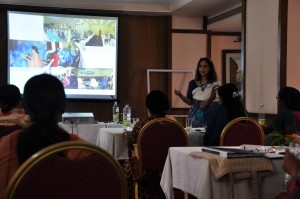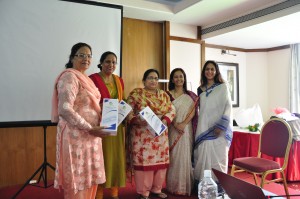ASAP At Katmandu: an Introduction to Task Shifting
This month, mark your calendars: September 28 is the International Day for the Decriminalization of Abortions. In that week, all nations will come together to demand for women’s rights to safe and legal abortions. ASAP has exciting events planned: a tweetathon on the 28th, and testimonials from providers and advocates across Asia.
But this week, we’d like to take you to the heart of a small, mountainous Asian country: Nepal. Ten years ago, abortion was criminal in Nepal. But high maternal mortality rates turned the government around and now, Nepal has one of the most liberal laws for first trimester terminations: all women who need the services are provided both medical and surgical care under 12 weeks of pregnancy, irrespective of their reasons, or their marital status. Up to 18 weeks, abortions are available in case of rape, incest, fetal anomalies, or to preserve the health of the mother. More importantly, Nepal’s law allows trained nurses and midwives to provide comprehensive abortion care (CAC) through the Manual Vacuum Aspiration method, and medical abortion pills up to 8 weeks of pregnancy.

This “task shifting” has done wonders for Nepal, and lightened the setbacks created by its harsh geography. Thanks to these trained mid-level providers, women across the country have access to basic health care; antenatal care; birthing, family planning and safe abortion services at health posts and sub health-posts that punctuate the remote regions of the mountainous country. The WHO and the IMA have endorsed the need for task shifting.
The profession of nursing is now a sought after field in Nepal. Young girls from remote areas now recognize the potential of training as a nurse, and taking their skills back to their regions. “Our young girls are so confident, and there is a lot of competition to be in this field,” said Kiran Bajracharya, the President of the Midwifery Association of Nepal.
Last week, the ASAP team was in Katmandu, Nepal to conduct an exchange study workshop for mid-level providers from four countries in the South Asian Region: Nepal, India, Pakistan and Bangladesh. With the exception of Nepal, the other participating countries lack comprehensive laws and policies enabling mid-level providers to perform safe abortions.
Nurses and midwives in India are not authorized to perform invasive procedures, or prescribe medications. “Doctors ask us to do these things clandestinely,” said Saraswati Kannekanti, a participant from India. “But if it is successful doctors take credit. If it fails we nurses are blamed.”
The story is a little different in Pakistan and Bangladesh. In Pakistan, midwives and nurses are trained to provide antenatal care, and even perform MVA, but the law itself allows abortions to be performed only to save the life of the mother, or for fetal anomalies. “Most women still think of abortion as a sin. So it is not possible to talk about it openly,” said Mehmooda Khwaja of Karachi.
In Bangladesh, nurses perform “menstrual regulation” for women who miss their period up to 9 weeks, using MVA but nurse lack in training. Additionally, medical abortion is not available. “Misoprostol is used for post partum haemorrhage,” said Sufia Khatun, from Bangladesh. “But there is no information on how to use it for abortion.”

The workshop presented them with these opportunities. After Dr. Shilpa Shroff of ASAP walked them through sessions on gender and sex, gender-based violence; and Adv. Sonali Regmi of the Center for Reproductive Rights (Nepal) discussed human rights, participants met Dr. Anjana Karki a CAC trainer who has worked frequently with Ipas Nepal, and helped produce several certified providers. Dr. Karki explained task shifting, and discussed MVA and MA at length. Then under her guidance, participants practiced on dummies.
They also got to see their Nepali peers in action. At the Thapathali hospital, and then at the district hospital in Baktapur, participants from India, Pakistan and Bangladesh watched their peers provide pre-abortion counseling, MVA and MA services, and post-abortion care to young Nepali women and girls. “We are struck by the quality of care,” said Yasmeen Saggu from Pakistan. “We are very, very impressed, and have learned a lot about the benefits of task shifting.”
This transition however was not as smooth as it seems today. On the fourth and last day of the workshop, Dr. Indira Basnett, ASAP Steering Committee Member and Country Director of Ipas Nepal spoke about the resistance from the medical community and the skepticism that preceded task shifting in Nepal. But studies undertaken by Ipas showed that the risk of complications of MVA was the same – about 2% – when performed by both nurses and doctors (the complications of medical abortion was negligible). This evidence slowly led to the amendment.
ASAP urged the participants to advocate for these rights in their own countries, and on the fourth day, the participants discussed their action plans with Dr. Shilpa Shroff, who helped them refine these goals. Will these translate into action, and will the potential of mid-level providers be recognized in Pakistan, Bangladesh and India? Hopefully it will.
As you will see this week, and later this month, Nepal’s journey was long and laborious. We’ll soon highlight the perseverance of advocates, civil societies and dedicated providers. As you will see, these efforts paid off, and the country can now boast of a model law for first trimester abortions.
For more pictures from our tour, visit our Facebook page. And stay tuned: we have videos coming your way to highlight the tour!






